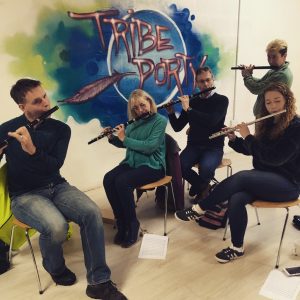September saw the return of the Edinburgh FluteFling workshops to Tribe Porty, while Glasgow also saw the first of Sharon Creasey’s monthly workshops.
The main focus for Edinburgh’s workshop was on developing our skills in learning by ear, exploring ways to listen and understanding the music.
We looked at a traditional Northumbrian tune in 3/4 time, Sir John Fenwick’s Floo’r Amang Them A’. This delightful, almost stately, tune was new to most of the group and it may be less commonly known than I thought, but it proved to work very well for us.
Sir John Fenwick’s, as it is usually known, has an interesting history (link to history of the tune here and here and also here for background on Sir John Fenwick himself) and may indeed be from 17th Century. It also became known as The Flower of Yarrow and Mary Scott, appearing in early 18thC Scottish collections. Resources (recording, PDF and ABC format) for this can be found in the Resources section.
We began by listening to the tune a few times in order to familiarise ourselves with it. Some time spent singing and moving to the music then helped to deeper internalise the tune before we began to see how this might even fit on the flute.
The process, which was opened up to me by Conal O Gráda when he taught a workshop at Cruinniú na bhFliúit in Ballyvourney earlier this year, follows the natural process of acquiring a tune and it should be straightforward to incorporate into learning from home.
I learned this tune from Newcastle guitarist Sean Paul Newman, basically on stage while performing with Absolutely Legless. His setting is in D and is a little more complex than the older versions in G or D that can be found. However, I have only heard others play this version, so it seems to be popular.
In the workshop we learned the tune from a rehearsal recording from a promising but short lived group in Portobello I was part of. Called Transverse, the trio consisted of Pamela Carr (flute, whistles, concertina), Ann Ward (flute, whistles, concertina) and myself (flutes, whistles) and played just a couple of local performances.
The recording was of a set and the tune that followed was a Breton waltz, which we also had a look at. I learned that waltz from a recording of the band Shegui and Valse de Galorn can be found in previous teaching information here, here and here).
The next Edinburgh workshop will be on Saturday 27 October. You can find out more, book tickets and also learn about the Glasgow workshops on the Workshops page. The 2nd FluteFling Aberdeen weekend will take place 16-18 November. More details and tickets can be found here.

